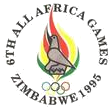1995 All-Africa Games

Official logo of the Games
|
|||
| Host city | Harare, Zimbabwe | ||
|---|---|---|---|
| Nations participating | 46 | ||
| Events | 17 sports | ||
| Opening ceremony | 13 September | ||
| Closing ceremony | 23 September | ||
| Officially opened by | Robert Mugabe | ||
| Main venue | National Sports Stadium | ||
|
|||
The 6th All-Africa Games were played from 13 to 23 September 1995 in Harare, Zimbabwe. 46 countries participated in eighteen sports.
South Africa, having previously been banned from competition by the other African nations, was invited to the games for the first time after the fall of Apartheid.
With a record 6000 athletes participating in the games the games were in danger of growing unmanageable. Juan Antonio Samaranch, asked the organizers not to try to copy the Olympic Games, because of the financial and organizational costs.
Petty controversy again entered the games. An Egyptian woman handball player was accused of being a man and the Egyptian team protested that the lace sleeves worn by the South African gymnasts were too "sexy".
Mozambiques World Champion 800 meter runner Maria de Lurdes Mutola won her speciality in Harare.
Of the 17 sports on the program 8 were open to participation by women: athletics, basketball, gymnastics, handball, swimming, table tennis, tennis and volleyball. Women's diving and netball were to be included but were reduced to demonstration sports due to a lack of entries.
At the closing ceremonies the torch was passed to Johannesburg, South Africa to begin preparations for the VIIth All-African Games in 1999.
Host nation
Discus thrower Adewale Olukoju and sprinter Mary Onyali became the first athletes to win four All-Africa gold medals. Onyali won the 100 and 200 metres races, and together with Josphat Machuka, Kenya (5000 metres and 10000 metres) they became the only athletes to win more than one event.
...
Wikipedia
